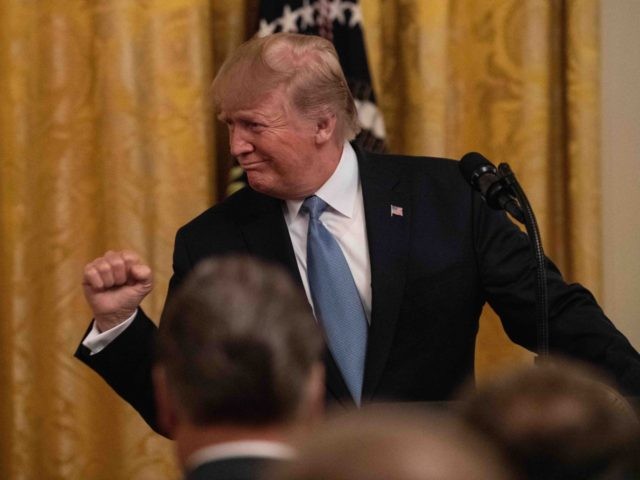President Donald Trump delivered a speech at the White House on Monday highlighting his administration’s environmental achievements.
The mainstream media greeted the idea with derision. But the speech was an important milestone, for three reasons: first, Trump distinguished between environmental protection and climate change policy; second, Trump supported “conservation” rather than “preservation”; and third, Trump argued convincingly that economic growth is good for the planet.
The first point is crucial. Democrats, and the media have conflated climate change with environmental protection. But climate change is primarily about energy policy, not about the environment. Climate change is also an abstract phenomenon, one whose effects — assuming even the worst-case models are true — will be relatively mild compared to other threats the planet faces. The dangers of polluted air, water, and soil — the historical focus of the Environmental Protection Agency — are usually more direct.
When it diverts time, energy, and money from these problems (which it can solve) to climate change (which it cannot solve), the EPA puts the environment at greater risk. “We’ve refocused the EPA back on its core mission,” Trump said on Monday, and he listed several examples: aggressive cleanup of Superfund hazardous waste sites; tightening drinking water standards; tackling the problem of lead-contaminated dust; restoring the Everglades; and signing legislation to deal with the damage of red tides.
Second, Trump supported the conservationist vision of Gifford Pinchot — the idea that the natural environment exists for human benefit, and that natural resources should be used responsibly. (The more dominant view among today’s environmentalists is that of John Muir, who championed preservation — the idea that the environment exists for its own sake, and that humans should keep it as pristine as possible.) Trump argued for opening federal lands and forests to careful use, rather than locking them away in perpetuity.
Trump used both “conservation” and “preservation”: “In the proud tradition of conservation that the Republican Party inherits from Teddy Roosevelt, we will preserve this land for our magnificent people,” he said. “That’s what we’re doing; we’re preserving our land. We’re making our land better and cleaner and safer.” Trump has, in fact, set aside some public lands. But he has also opened more lands to hunting, fishing, and recreation. He has also opened forests to responsible logging, partly to control wildfires.
Third, Trump made the point that not only is economic growth compatible with environmental stewardship, but went further, saying that growth is better for the environment. That runs counter to environmentalist orthodoxy, which holds that most economic activity is inherently damaging to our planet. He explained: “When we innovate, produce, and grow, we’re able to unleash technologies and processes that make the environment better while … taking [production] away from foreign polluters, and back to American soil.”
As an example, Trump cited the fact that America’s “energy-related carbon emissions have declined more than any other country on Earth” because of innovation in the energy sector, especially fracking for natural gas — which the environmentalists and the Obama administration opposed. Trump did not reject renewables — he supported solar energy, for example, alongside nuclear energy and other sources — but placed his confidence in economic growth and innovation, not in the heavy hand of government regulation.
Trump and the other officials who spoke stressed that the choice “between economic growth and environmental protection” was a “false choice.” We have actually heard that before: President Barack Obama said it, numerous times (here and here, for example). But Obama argued that we could have both environmental protection and economic growth only if we accepted growth would come from government-subsidized renewable energy, within a highly regulated economy — in other words, under fanciful constraints.
Obama’s vision for “green jobs” was utopian, an early version of the “Green New Deal” introduced by Rep. Alexandria Ocasio-Cortez (D-NY) and embraced by nearly every Democratic presidential candidate. (Though given that her plan calls for federal guarantees of high-paying jobs to everyone, including illegal aliens, perhaps a better name for it would be the “Red New Deal.)
The mainstream media, who are less reliable on this issue than any other (the UK Guardian, which is still printed on paper, now uses “climate emergency” rather than “climate change”), barely noticed the substance of the speech. National Public Radio claimed that Trump “made no mention of climate change,” failing to inform listeners that Trump spoke at length about the reduction in U.S. emissions. Axios treated the speech largely as a story of palace intrigue: why else would Trump talk about Democrats’ issue?
As Trump delivered his speech, Ocasio-Cortez was tweeting hysterically about the ongoing flooding in Washington, DC — hardly an unknown phenomenon — as if it were evidence that climate change is already destroying planet Earth, right on schedule. She and Sen. Bernie Sanders (I-VT) announced plans to introduce legislation this week to declare climate change a “national emergency” — but not enough of an emergency for her to stop flying to Puerto Rico or for Sanders to back emissions-free nuclear power.
Trump’s policy is grounded in reality — which is why it is more successful and sustainable, both politically and environmentally.
Joel B. Pollak is Senior Editor-at-Large at Breitbart News. He earned an A.B. in Social Studies and Environmental Science and Public Policy from Harvard. He is a winner of the 2018 Robert Novak Journalism Alumni Fellowship. He is also the co-author of How Trump Won: The Inside Story of a Revolution, which is available from Regnery. Follow him on Twitter at @joelpollak.

COMMENTS
Please let us know if you're having issues with commenting.